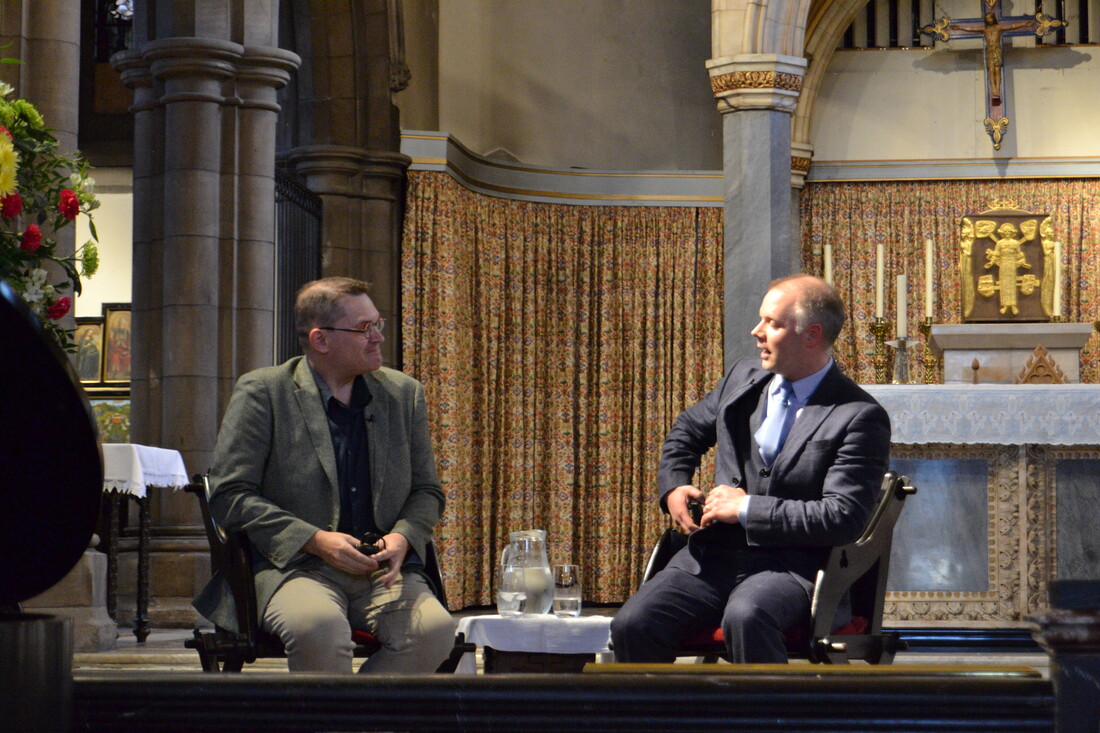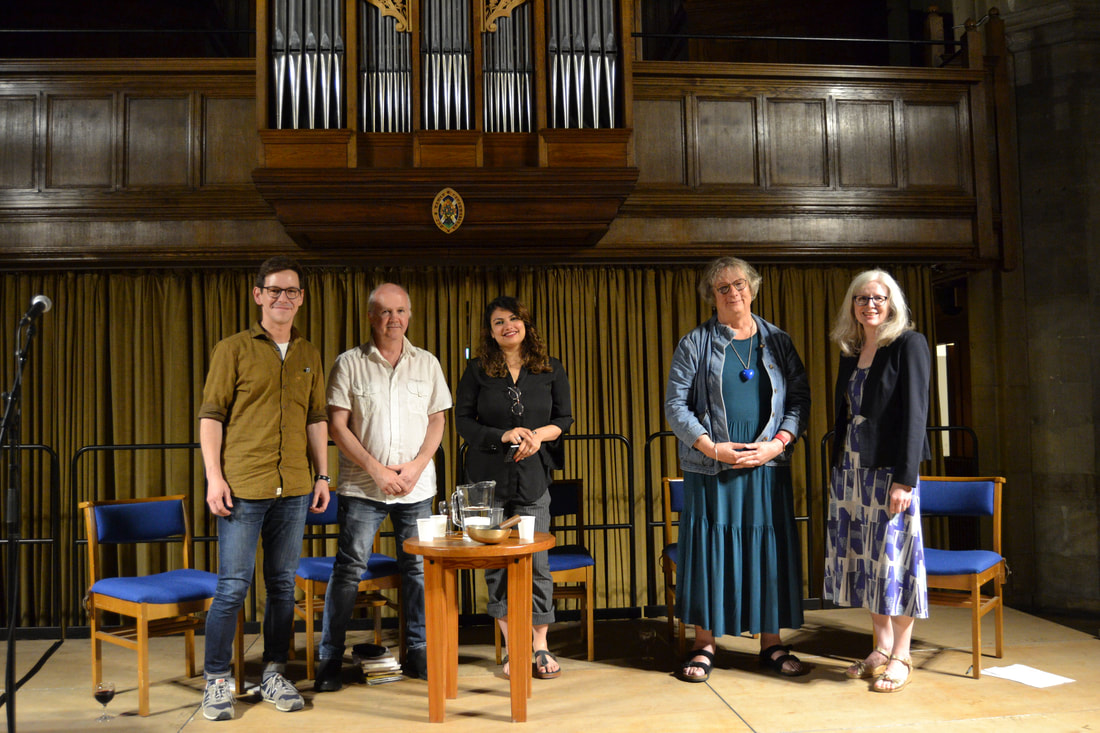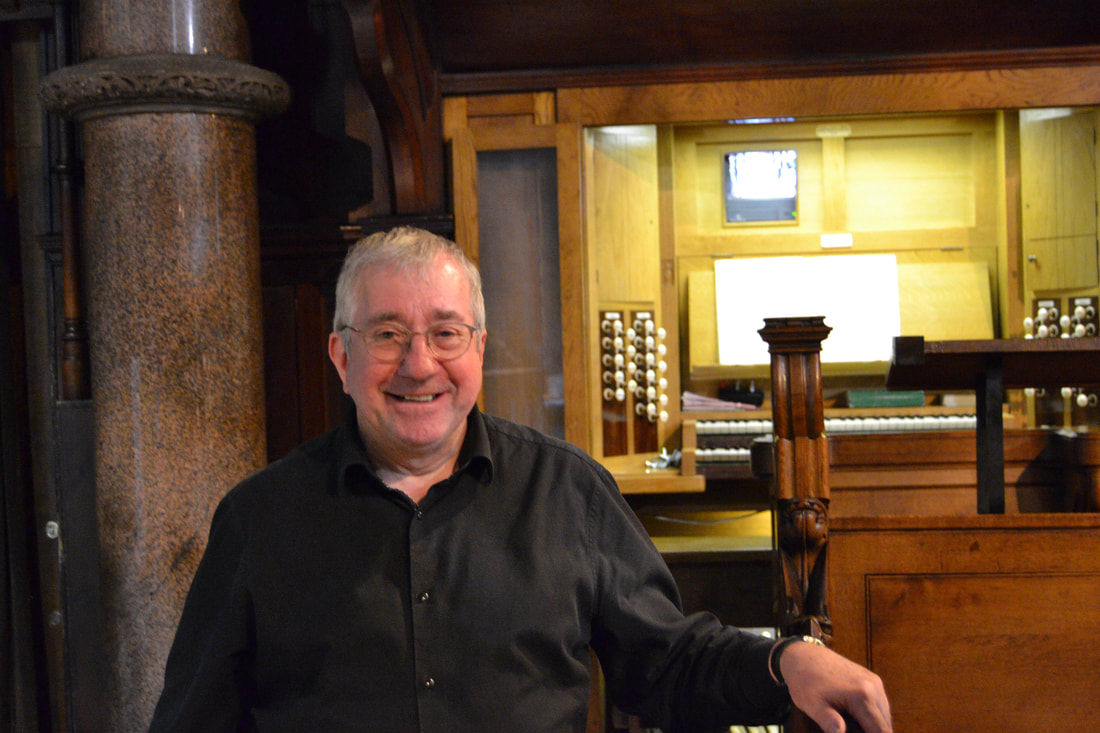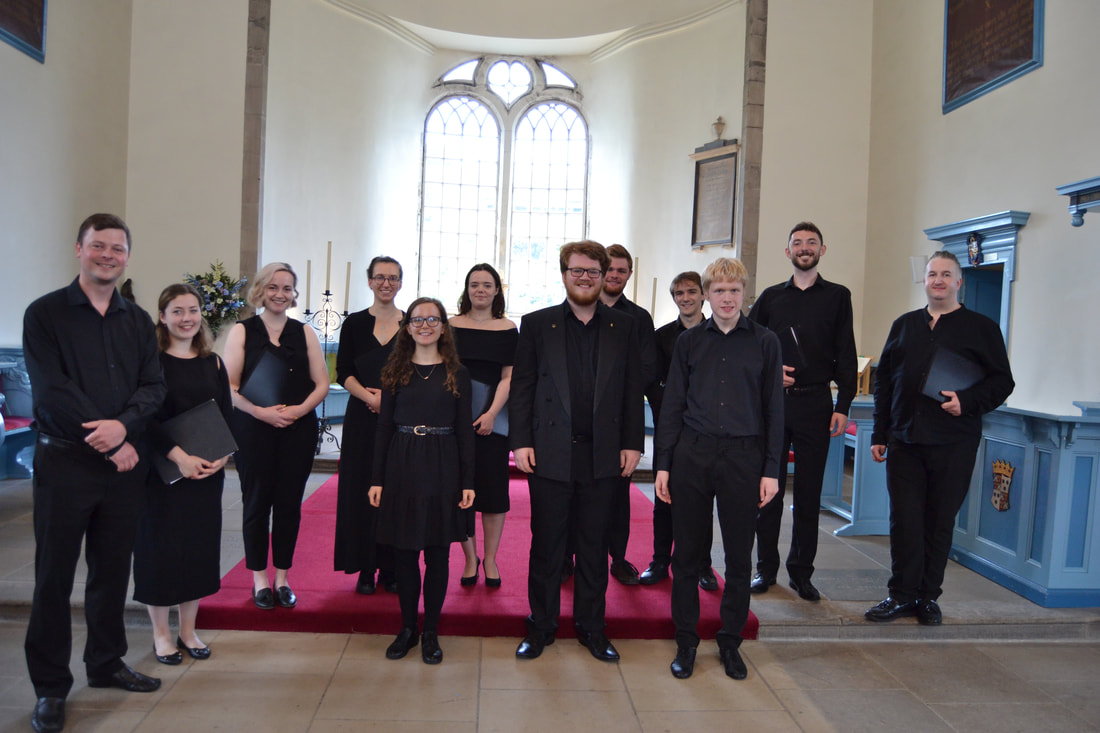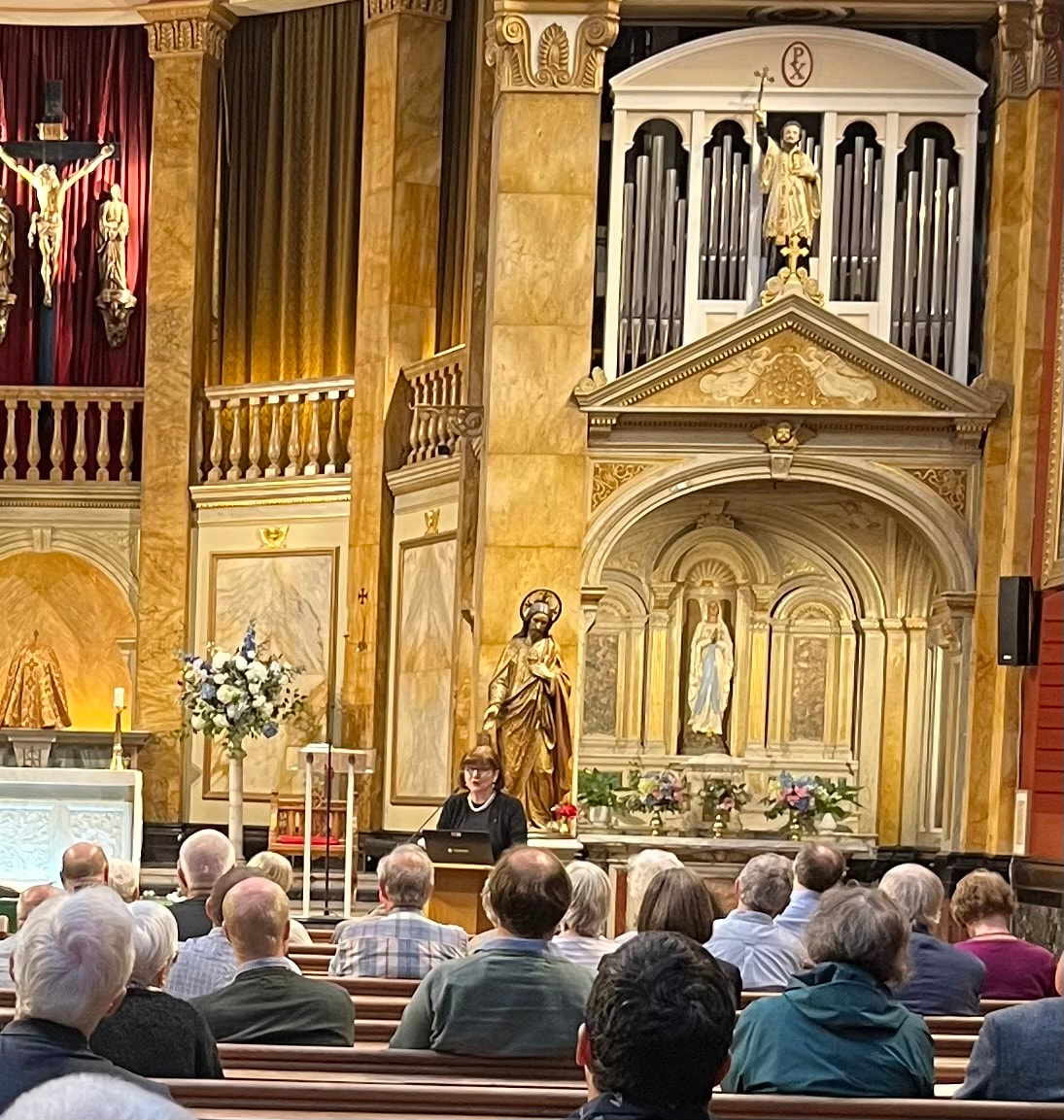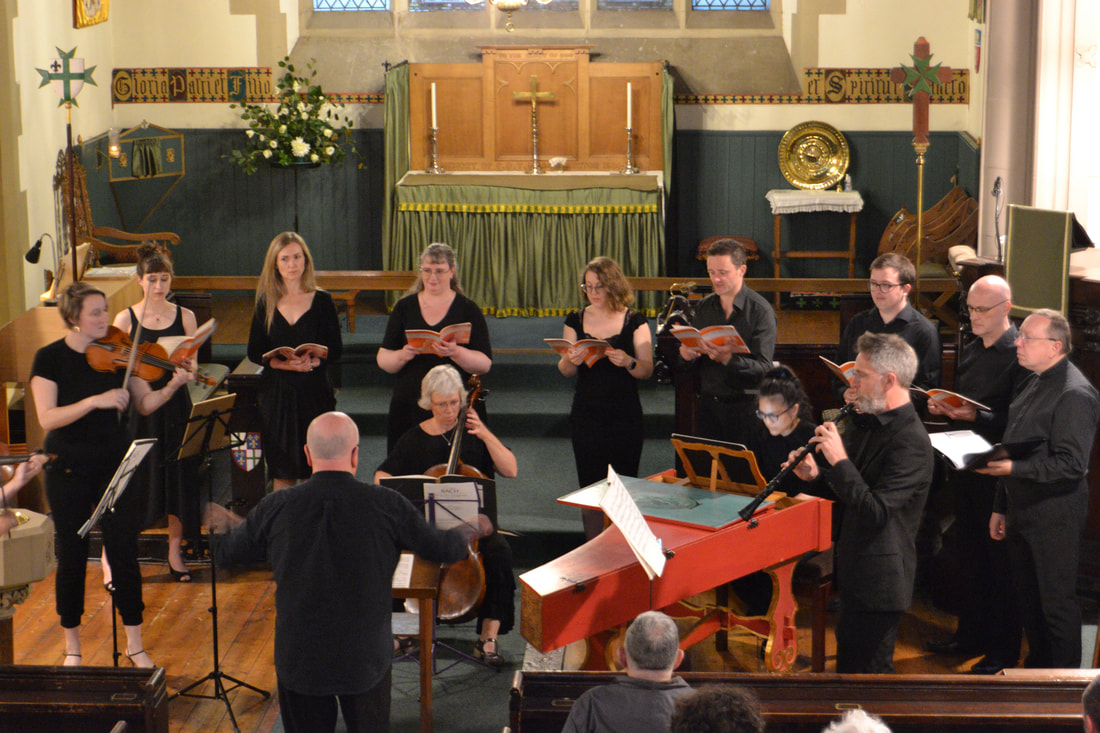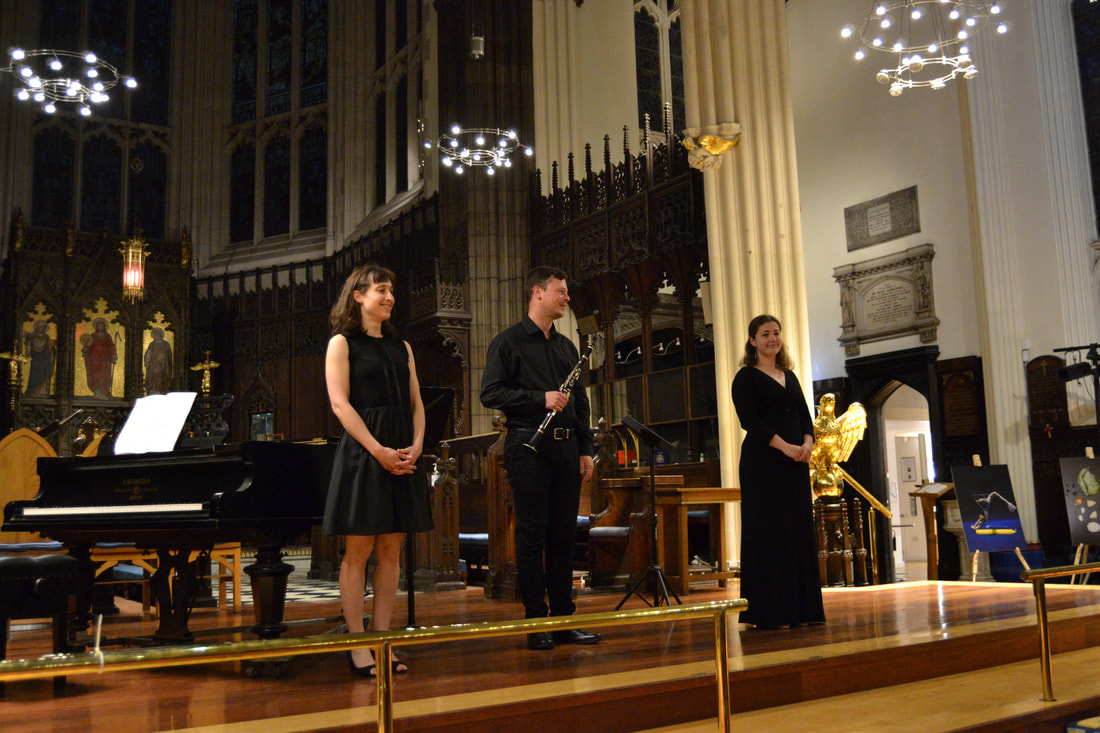FESTIVAL 2023 in REVIEW
In addition to opening and closing church services, the 2023 Edinburgh Festival of the Sacred Arts included seventeen events ranging over many art forms -- drama, music, literature, the visual arts, floral art and film. Almost half of them attracted reviews, and two were given the top rating of 5/5. You can read the reviews on this page, with accompanying photographs.
In addition to opening and closing church services, the 2023 Edinburgh Festival of the Sacred Arts included seventeen events ranging over many art forms -- drama, music, literature, the visual arts, floral art and film. Almost half of them attracted reviews, and two were given the top rating of 5/5. You can read the reviews on this page, with accompanying photographs.
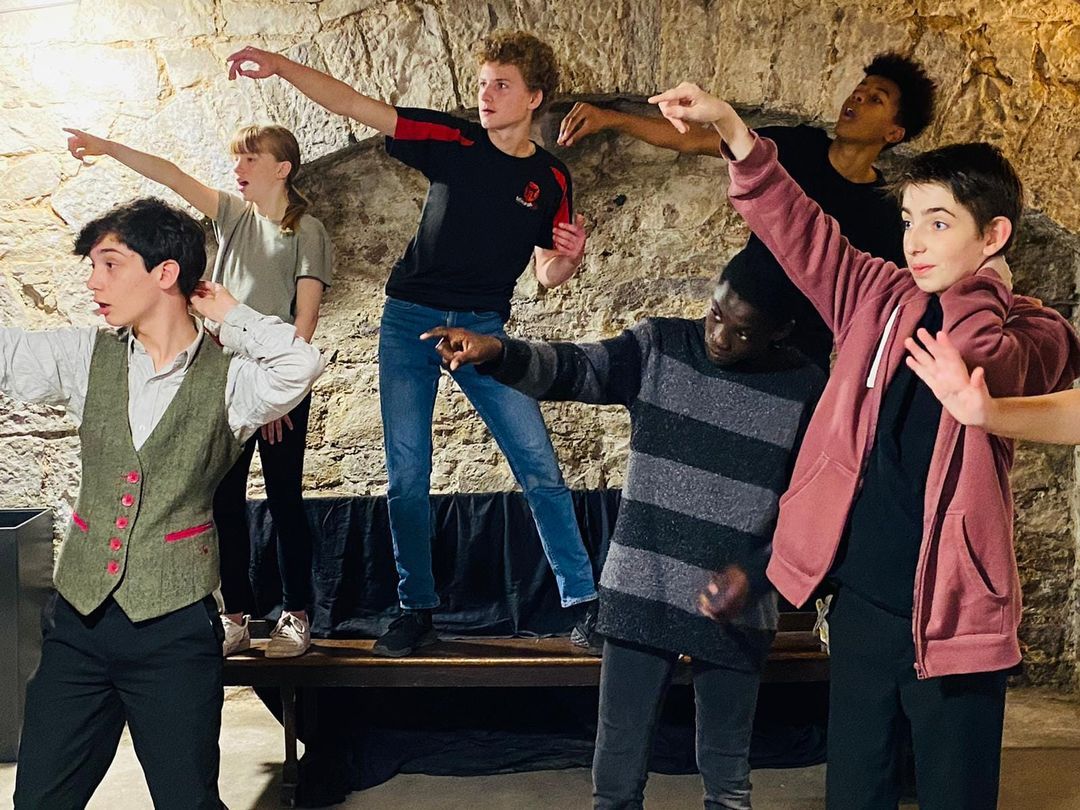
(from the Edinburgh Guide)
Venue: St Vincent's Chapel Company: Green Shoots Youth Theatre
Production: The Mysteries - Reimagined Performers: Peter Holloway (writer), Faith Sutherland (director), the Green Shoots Youth Theatre
Mystery Plays would have been well-known in the mediaeval period, and were used as a way of teaching famous biblical tales in a fun, entertaining and accessible way. Real stories, about real people, but brought to life for a contemporary crowd. The venue was small, but suitable - dimly lit, the underground caverns of St Vincent's Undereroft evoking something of the historicity and spirituality that the performance would try to mirror. It actually covered five key stories - Noah, the Shepherds, the Flight into Egypt, the final events at Jerusalem, and Christ's Resurrection. Peter Holloway's reimagining of these stories for our own time has been wonderfully done. One of the things that strikes you as most impressive is how faithful his rendering is to the original biblical text. And yet there were some inspired additions and embellishments - the 'reporter' in the latter scenes narrating the biblical drama in a rolling-news type of way. At other points, and thinking of another modern remaking, it conjured up connotations with the 1961 version of West Side Story. The 'Flight' additionally invited us to make obvious connections to the plight of refugees today, and this was enhanced by the inclusion of helicopter sound effects - an ingenious linking between the old and the new. It made us question where the actual qualitative difference lay, and if priorities have actually changed over time.
It was a bit unfortunate that the final resurrection scene seemed (ironically) anti-climactic, the show almost seeming to fizzle out at the end. However - equally clear - was the huge amount of preparation, hard work and commitment involved. It initially ran the risk of coming across as an end-of-term Revue - but crucially it made us think, and ask a number of relevant questions. Speaking to the Director afterwards, it was fascinating to learn that the cast didn't actually know each other three weeks ago - they'd been brought together specifically for this project, and this was an excellent illustration of collaborative teamwork. Faith spoke about the joy of watching the youngsters grow, and giving them the opportunity to experience the energy of the Fringe.
Rating 3/5
Venue: St Vincent's Chapel Company: Green Shoots Youth Theatre
Production: The Mysteries - Reimagined Performers: Peter Holloway (writer), Faith Sutherland (director), the Green Shoots Youth Theatre
Mystery Plays would have been well-known in the mediaeval period, and were used as a way of teaching famous biblical tales in a fun, entertaining and accessible way. Real stories, about real people, but brought to life for a contemporary crowd. The venue was small, but suitable - dimly lit, the underground caverns of St Vincent's Undereroft evoking something of the historicity and spirituality that the performance would try to mirror. It actually covered five key stories - Noah, the Shepherds, the Flight into Egypt, the final events at Jerusalem, and Christ's Resurrection. Peter Holloway's reimagining of these stories for our own time has been wonderfully done. One of the things that strikes you as most impressive is how faithful his rendering is to the original biblical text. And yet there were some inspired additions and embellishments - the 'reporter' in the latter scenes narrating the biblical drama in a rolling-news type of way. At other points, and thinking of another modern remaking, it conjured up connotations with the 1961 version of West Side Story. The 'Flight' additionally invited us to make obvious connections to the plight of refugees today, and this was enhanced by the inclusion of helicopter sound effects - an ingenious linking between the old and the new. It made us question where the actual qualitative difference lay, and if priorities have actually changed over time.
It was a bit unfortunate that the final resurrection scene seemed (ironically) anti-climactic, the show almost seeming to fizzle out at the end. However - equally clear - was the huge amount of preparation, hard work and commitment involved. It initially ran the risk of coming across as an end-of-term Revue - but crucially it made us think, and ask a number of relevant questions. Speaking to the Director afterwards, it was fascinating to learn that the cast didn't actually know each other three weeks ago - they'd been brought together specifically for this project, and this was an excellent illustration of collaborative teamwork. Faith spoke about the joy of watching the youngsters grow, and giving them the opportunity to experience the energy of the Fringe.
Rating 3/5
Venue: St Mary's Roman Catholic Cathedral Company: Schola Cantorum Production: Ubi Caritas (2011), A Welsh Prayer (2014), A Spotless Rose (2011), The Beatitudes (2013), 0
Sweetest Jesus (2012), Wherever You Are (2011), Selwyn Service: II Nunc Dimittis (2017), Coronation Kyrie (2023), I am the Gentle Light (2012), Ave Maria (2012), The Shadow of thy Cross (2014), Blessing (2013) Performers: Paul Mealor (composer), Michael Ferguson (director/interviewer), Schola Cantorum
The music of Paul Mealor has been a blessing and inspiration in the world of contemporary choral music. Two of his most well-known works opened each half of the performance. In the first, we heard Ubi Caritas, first performed back in 2011 by the choirs of Westminster Abbey and HM Chapel Royal on the occasion of the wedding of the (now) TRH Duke & Duchess of Cambridge. The recital was punctuated with informative explanation, given via the form of a conversation between Mealor himself and Michael Ferguson. Mealor told us that his inspiration for Ubi Caritas was that the Duchess of Cambridge was about to become a 'servant of the nation', and this well-known text, now set afresh, recalled the act of Jesus washing the feet of his disciples. Mealor said that composing was, for him, like praying - an act of giving, but offered meditatively: The Spotless Rose was one such fruit of this. He further explained that composing could be a lonely but beautiful thing - which led us fittingly into 'The Beatitudes, before Wherever You Are completed the first half. This latter piece transcended all the musical genres: classical, folk and religious - it was at one time played by Chris Evans on the radio no less than twice a day! Being inspired by an encounter with Gareth Malone, the anthem emerged as a piece for partners of active servicemen, using some of the letters submitted by those women. The principal item in the second half was the Coronation Kyrie, commissioned for that event in May this year, and sung by the same joint choirs as the Ubi Caritas above. You did get the impression throughout this performance that the 10 voices of Schola Cantorum sometimes appeared insufficient to the music required, and the sound was often lost in the cathedral's expansive space. We certainly appreciated Mealor's musical genius (and this was enhanced by the commentary given), but the performance of his works fell a little bit short.
Rating 3/5
Sweetest Jesus (2012), Wherever You Are (2011), Selwyn Service: II Nunc Dimittis (2017), Coronation Kyrie (2023), I am the Gentle Light (2012), Ave Maria (2012), The Shadow of thy Cross (2014), Blessing (2013) Performers: Paul Mealor (composer), Michael Ferguson (director/interviewer), Schola Cantorum
The music of Paul Mealor has been a blessing and inspiration in the world of contemporary choral music. Two of his most well-known works opened each half of the performance. In the first, we heard Ubi Caritas, first performed back in 2011 by the choirs of Westminster Abbey and HM Chapel Royal on the occasion of the wedding of the (now) TRH Duke & Duchess of Cambridge. The recital was punctuated with informative explanation, given via the form of a conversation between Mealor himself and Michael Ferguson. Mealor told us that his inspiration for Ubi Caritas was that the Duchess of Cambridge was about to become a 'servant of the nation', and this well-known text, now set afresh, recalled the act of Jesus washing the feet of his disciples. Mealor said that composing was, for him, like praying - an act of giving, but offered meditatively: The Spotless Rose was one such fruit of this. He further explained that composing could be a lonely but beautiful thing - which led us fittingly into 'The Beatitudes, before Wherever You Are completed the first half. This latter piece transcended all the musical genres: classical, folk and religious - it was at one time played by Chris Evans on the radio no less than twice a day! Being inspired by an encounter with Gareth Malone, the anthem emerged as a piece for partners of active servicemen, using some of the letters submitted by those women. The principal item in the second half was the Coronation Kyrie, commissioned for that event in May this year, and sung by the same joint choirs as the Ubi Caritas above. You did get the impression throughout this performance that the 10 voices of Schola Cantorum sometimes appeared insufficient to the music required, and the sound was often lost in the cathedral's expansive space. We certainly appreciated Mealor's musical genius (and this was enhanced by the commentary given), but the performance of his works fell a little bit short.
Rating 3/5
Production: Voyages of Discovery. Alison Jack & Samuel Tongue (hosts); Rob Mackenzie, Jo Clifford & Mendha Singh (performers)
This was a thought-provoking evening, exploring the inspiration behind the literary works of three contemporary poets. Alison Jack (Principal of New College) and Samuel Tongue (award-winning poet) hosted and chaired the evening. It was split into two halves, where first we heard extracts from the various performers' works, followed by a panel
discussion after the Interval. Rob Mackenzie was first up, and gave us a selection of poetry about making connections - finding the sacred amongst the chaos, in the clutter and confusion of the city. Unfortunately, the sound system meant that few of us could actually hear what was being said - which was particularly unfortunate for a poetry recital. This was also the case with the third poet, Mendha Singh. Her opening work was about the hiddenness - but prevalence - of God, even in seemingly secular times. Both of these poets seemed overly reliant on the books being read from - none of the works were particularly long, and it may have been better if these could have been committed to memory. Jo Clifford, the central act, presented part of her 'Gospel according to Jesus - Queen of Heaven'. The work has been widely translated and performed - indeed across the world. It is based on Jesus coming back to earth as a trans-woman, and picks up on such themes as embodying dishonour as a privilege, the last being first (and the first, last), and Christ returning to stand before those with hearts marred by hatred.
In the discussion that followed, the point was oft made by the panel that religion historically strives to marshal the evidence behind pre-determined conclusions. However, the panel never seemed to get much beyond this themselves - while giving a passionate defence of progressive liberalism, the inclusiveness' they advanced made little room, it seemed, for those with differing views. There was something somewhat uncomfortable about this event being held in a church - but what is the Fringe if it can't be controversial, and further push the boundaries. However, the main problems with this performance concerned the audibility in the first half, and the discussion in the second - where the panellists didn't untangle the knots in the debate.
Rating 2/5
This was a thought-provoking evening, exploring the inspiration behind the literary works of three contemporary poets. Alison Jack (Principal of New College) and Samuel Tongue (award-winning poet) hosted and chaired the evening. It was split into two halves, where first we heard extracts from the various performers' works, followed by a panel
discussion after the Interval. Rob Mackenzie was first up, and gave us a selection of poetry about making connections - finding the sacred amongst the chaos, in the clutter and confusion of the city. Unfortunately, the sound system meant that few of us could actually hear what was being said - which was particularly unfortunate for a poetry recital. This was also the case with the third poet, Mendha Singh. Her opening work was about the hiddenness - but prevalence - of God, even in seemingly secular times. Both of these poets seemed overly reliant on the books being read from - none of the works were particularly long, and it may have been better if these could have been committed to memory. Jo Clifford, the central act, presented part of her 'Gospel according to Jesus - Queen of Heaven'. The work has been widely translated and performed - indeed across the world. It is based on Jesus coming back to earth as a trans-woman, and picks up on such themes as embodying dishonour as a privilege, the last being first (and the first, last), and Christ returning to stand before those with hearts marred by hatred.
In the discussion that followed, the point was oft made by the panel that religion historically strives to marshal the evidence behind pre-determined conclusions. However, the panel never seemed to get much beyond this themselves - while giving a passionate defence of progressive liberalism, the inclusiveness' they advanced made little room, it seemed, for those with differing views. There was something somewhat uncomfortable about this event being held in a church - but what is the Fringe if it can't be controversial, and further push the boundaries. However, the main problems with this performance concerned the audibility in the first half, and the discussion in the second - where the panellists didn't untangle the knots in the debate.
Rating 2/5
mTodesbanden, Estranden ist der heil'ge Christ, Heut' triumphiret Gottes Sohn (J. S. Bach); Chorale Variations - 'Alle Menschen müssen sterben' (Pachelbel); Offertoire pour le Jour de Pâques - 'O filii et filiae' (Dandrieu); Three Movements from L'Ascension - Majesté du Christ, Transports de joie, Prière du Christ (Messiaen)
Performers: John Kitchen (organist)
Organ recitals often begin with pieces from J. S. Bach, and this indeed followed that familiar format. But there were two main things which set it apart. The first was John Kitchen's commentary as we proceeded through the programme. Kitchen has been so central to Edinburgh's musical life over so many years, and is Edinburgh City Organist, with performing and curatorial duties at the Usher Hall. Yet he has such a warm, friendly and humorous way - he really excited the audience's interest, and the fascinating detail he gave us made us appreciate the music the more. The second great feature of this afternoon's performance was the immense amount of thought and care that had clearly gone into the pieces chosen. Subtitled "Music for Easter and Ascension", we began with three of Bach's organ chorales for Easter/ Ascension. Developed from plainsong, Bach had worked these out of pre-existing material, with the Lutheran influence evident. The basis for Pachelbel's 'Chorale Variations' was immediately recognisable to many - the tune in in the UK being used for a famous Easter hymn. We learned that in Germany, it is the setting for an Ascension hymn. This was therefore a great choice for the programme, in straddling its liturgical themes. Kitchen proceeded through the work with some subtle, beautiful and inspired registrations. I think we all enjoyed hearing the Zimbelstern at the end - while maybe seeming a little eccentric to have this added to a Fr Willis organ, we were glad that Kitchen had arranged this! The concluding three movements from Messiaen's L'Ascension began with a slow mediation based on the glorification passages from St John. It was ponderous and reflective, reflecting something of the unease and disquiet its underlying prayer embodied. By way of contrast, we had pretty much full organ all the way through for 'Transports de joie', with some wonderful scrunchy harmonies. We finished with one of Messiaen's trademark slow movements - trying to conjure up a vision of eternity, and reminiscent of the Quartet for the End of Time which we had the privilege of hearing at a previous year’s Festival.
Rating 4/5
Performers: John Kitchen (organist)
Organ recitals often begin with pieces from J. S. Bach, and this indeed followed that familiar format. But there were two main things which set it apart. The first was John Kitchen's commentary as we proceeded through the programme. Kitchen has been so central to Edinburgh's musical life over so many years, and is Edinburgh City Organist, with performing and curatorial duties at the Usher Hall. Yet he has such a warm, friendly and humorous way - he really excited the audience's interest, and the fascinating detail he gave us made us appreciate the music the more. The second great feature of this afternoon's performance was the immense amount of thought and care that had clearly gone into the pieces chosen. Subtitled "Music for Easter and Ascension", we began with three of Bach's organ chorales for Easter/ Ascension. Developed from plainsong, Bach had worked these out of pre-existing material, with the Lutheran influence evident. The basis for Pachelbel's 'Chorale Variations' was immediately recognisable to many - the tune in in the UK being used for a famous Easter hymn. We learned that in Germany, it is the setting for an Ascension hymn. This was therefore a great choice for the programme, in straddling its liturgical themes. Kitchen proceeded through the work with some subtle, beautiful and inspired registrations. I think we all enjoyed hearing the Zimbelstern at the end - while maybe seeming a little eccentric to have this added to a Fr Willis organ, we were glad that Kitchen had arranged this! The concluding three movements from Messiaen's L'Ascension began with a slow mediation based on the glorification passages from St John. It was ponderous and reflective, reflecting something of the unease and disquiet its underlying prayer embodied. By way of contrast, we had pretty much full organ all the way through for 'Transports de joie', with some wonderful scrunchy harmonies. We finished with one of Messiaen's trademark slow movements - trying to conjure up a vision of eternity, and reminiscent of the Quartet for the End of Time which we had the privilege of hearing at a previous year’s Festival.
Rating 4/5
Venue: Canongate Kirk Company: Edinburgh Festival of the Sacred Arts Production: And I saw a new heaven (Carlo Massimo); Anthem to St Andrew & The Lord is near (Alexander McNamee); If ye love me (Thomas Tallis); O soul mender (Viktor Seifert); How still and peaceful (Lucy Whitehead); Missa lucerna oleum (Calum Robertson); Oh, that I had wings like a dove (Carlo Massimo); Jesus Christ the apple tree (Elizabeth Poston); Sanctus (Alexander McNamee Performers: Calum Robertson (director/composer); Sally Carr & Anna Kaye (sopranos); Anna Yule & Holly Gowen (altos); Rhys Williams & Fraser Macdonald (tenors); Dale McIntyre & Joshua McCullough
(basses)
This was one of those rare moments at the Fringe where you felt you had really witnessed something special. Whereas we are used to hearing performances of the old masters and classics, the principal pieces in this programme were entirely new - and all written by young composers. For both the quality of the recital, and the underlying concept, this was truly outstanding. Our afternoon burst into life with the first work's fortissimo crunchy organ chords, and the exquisite singing that followed. Every tool in the armoury was being used here. The Revd Professor Gordon Graham then opened the afternoon, introducing the Director, Calum Robertson, as one of the 'oldest' composers present - although, as we were shortly to discover, that wasn't quite true, with an interspersed work from Tallis!
The newly written works of the younger composers showcased some wonderful talent. McNamee's 'Anthem to St Andrew beautifully recalled the biblical text in song, and Seifert's 'O soul mender', was an amazing rich blend of piano accompaniment, choral music but also some spoken word too; Whitehead's 'Howe still and peaceful' contained some glorious harmonies. When some of the composers were brought forward, it was surprising to see how young they were - but, to us in the audience, this only made their achievements seem even the more impressive. Robertson himself told us that his Mass setting 'Missa Lucerna Oleum' was written during Covid (when restrictions only allowed one singer in churches) and so there was more time allowed for artistic endeavour. We heard four of the pieces from this work - of particular note was the rather bright Kyrie, in an upbeat setting overall. Massimo's 'O, that I had wings' was based on classical cathedral antiphons, though here reduced for 8 singers. It still retained its power. And with the composers themselves augmenting the Choir for 'Jesus Christ the Apple tree', we were poised for McNamee's piece, which concluded the recital: his rousing setting of the 'Sanctus'. We even had copies of the scores of the compositions available after - to encourage these newly written pieces to be enjoyed ever onward. Pulling this ground-breaking event together was surely an achievement.
Rating 5/5
(basses)
This was one of those rare moments at the Fringe where you felt you had really witnessed something special. Whereas we are used to hearing performances of the old masters and classics, the principal pieces in this programme were entirely new - and all written by young composers. For both the quality of the recital, and the underlying concept, this was truly outstanding. Our afternoon burst into life with the first work's fortissimo crunchy organ chords, and the exquisite singing that followed. Every tool in the armoury was being used here. The Revd Professor Gordon Graham then opened the afternoon, introducing the Director, Calum Robertson, as one of the 'oldest' composers present - although, as we were shortly to discover, that wasn't quite true, with an interspersed work from Tallis!
The newly written works of the younger composers showcased some wonderful talent. McNamee's 'Anthem to St Andrew beautifully recalled the biblical text in song, and Seifert's 'O soul mender', was an amazing rich blend of piano accompaniment, choral music but also some spoken word too; Whitehead's 'Howe still and peaceful' contained some glorious harmonies. When some of the composers were brought forward, it was surprising to see how young they were - but, to us in the audience, this only made their achievements seem even the more impressive. Robertson himself told us that his Mass setting 'Missa Lucerna Oleum' was written during Covid (when restrictions only allowed one singer in churches) and so there was more time allowed for artistic endeavour. We heard four of the pieces from this work - of particular note was the rather bright Kyrie, in an upbeat setting overall. Massimo's 'O, that I had wings' was based on classical cathedral antiphons, though here reduced for 8 singers. It still retained its power. And with the composers themselves augmenting the Choir for 'Jesus Christ the Apple tree', we were poised for McNamee's piece, which concluded the recital: his rousing setting of the 'Sanctus'. We even had copies of the scores of the compositions available after - to encourage these newly written pieces to be enjoyed ever onward. Pulling this ground-breaking event together was surely an achievement.
Rating 5/5
Venue: Catholic Church of the Sacred Heart Company: Stonyhurst College / Edinburgh Festival of the Sacred Arts Production: 'Jacobite Relics & the Divine Right of Kings' (talk)
Performers: Dr Jan Graffius (speaker)
Dr Janet Graffius has been the Curator of Collections and Historic Libraries at Stonyhurst College since 2001, and has done a wonderful job in ordering, documenting and caring for the vast collection of Catholic treasures that Stonyhurst still looks after. These consist, in part, of relics rescued from the Protestant reformation - and it was superb that a number of these had been brought from the College to the church this evening, displayed on a small table at the front. The lecture spanned a fair number of years - covering Mary Queen of Scots to Prince Charles Edward Stuart. We began with an extended piece about the importance of anointing, and its continuing relevance to the 'divine right of kings' - we all remembered the recent ceremonies when King Charles III was crowned earlier this year. As the address progressed, a number of items were referred to, though unfortunately - due to their fragility - only some were available to view. Those that we were able to see included a lock of Queen Mary's hair, James Il's Easter Book, and Robert Gordon's Powder Horn. The talk was quite academic, with a plethora of dates and details - this volume of information was undoubtedly impressive, and testified to the huge amount of hard work and research that had gone into the presentation.
However, it may have been a bit much for a Fringe occasion, and the event could have been made more accessible by, e.g., having a screen projecting the images far up on the table at the front - so we could all see the pieces referred to, as the talk went on to describe them. There was a great opportunity for us at the end to view the relics, and Dr Graffius was keen to answer our questions. Incidentally, she told me that the thought of speaking to Scots in Scotland, about Scottish history (even though a Scot herself )had really wracked her nerves. But this was a really inspiring and informative evening, with a lot to absorb and ponder.
Rating 3/5
Performers: Dr Jan Graffius (speaker)
Dr Janet Graffius has been the Curator of Collections and Historic Libraries at Stonyhurst College since 2001, and has done a wonderful job in ordering, documenting and caring for the vast collection of Catholic treasures that Stonyhurst still looks after. These consist, in part, of relics rescued from the Protestant reformation - and it was superb that a number of these had been brought from the College to the church this evening, displayed on a small table at the front. The lecture spanned a fair number of years - covering Mary Queen of Scots to Prince Charles Edward Stuart. We began with an extended piece about the importance of anointing, and its continuing relevance to the 'divine right of kings' - we all remembered the recent ceremonies when King Charles III was crowned earlier this year. As the address progressed, a number of items were referred to, though unfortunately - due to their fragility - only some were available to view. Those that we were able to see included a lock of Queen Mary's hair, James Il's Easter Book, and Robert Gordon's Powder Horn. The talk was quite academic, with a plethora of dates and details - this volume of information was undoubtedly impressive, and testified to the huge amount of hard work and research that had gone into the presentation.
However, it may have been a bit much for a Fringe occasion, and the event could have been made more accessible by, e.g., having a screen projecting the images far up on the table at the front - so we could all see the pieces referred to, as the talk went on to describe them. There was a great opportunity for us at the end to view the relics, and Dr Graffius was keen to answer our questions. Incidentally, she told me that the thought of speaking to Scots in Scotland, about Scottish history (even though a Scot herself )had really wracked her nerves. But this was a really inspiring and informative evening, with a lot to absorb and ponder.
Rating 3/5
Venue: St Vincent's Chapel Company: Howe Street Band / Edinburgh Festival of the Sacred Arts Production: Cantata: Nach dir, Herr, verlanget mich (J. S. Bach); Pastorella in F major for Organ (J. S. Bach); Chandos Anthem 11 - Let God Arise (G. F. Handel) Performers: Les Shankland (director); The Howe Street Band - Ruth Slater (leader) & Emma Lloyd (violins), Nicola Chakraverty (cello), Mark Baigent (oboe), Tiffany Vong (harpsichord & organ); Singers Philippa Wood & Jessica Rucinski (sopranos), Katie Brooks & Reiltin Nic Charthaigh Duill (altos), James Hutchinson & Michael Scanlon (tenors), Hugh Hillyard-Parker & Simon Filsell (basses)
Both born in 1685, not too far apart, it is remarkable that Bach and Handel never met, following divergent musical paths. That they nonetheless converged this evening was a joy for the audience at St Vincent's. We began with one of Bach's early church cantatas - unusual for making no use of Lutheran chorale preludes - and partly based on Psalm 25. The whole was brilliantly performed - while there was also something notable about each section too, as was especially the case with Philippa Wood's singing of the first (brief) aria. The balance of the voices in the second Chorus movement was incredibly well handled, while the rhythmic crescendos in the concluding chaconne, and sense of liberated musicality, reflected the movement from sorrow to joy. It was lovely to hear one of Bach's less well-known, but equally exquisite, works to follow. The Pastorella in F major may have been intended for a more domestic setting, and only the opening Pastorale requires pedals. 'Let God Arise' was one of a set of six anthems that Handel composed to be performed in the chapel at Cannons (home of the Duke of Chandos), to which the composer was music director. We saw some classical Handel in this work, though here within his more intimate church repertoire. Unlike Bach, his compositions are known for being operatic - a man of the theatre - and he is well-known for his settings of some great Old Testament texts. It still seems a bit strange as to why Handel set the 'O sing unto the Lord' in this work to a minor key - though it was performed with poise and presence. At the end, the penultimate Chorus item was sung with all the energy the corresponding scene envisaged - leading into the climactic movement, in which you couldn't help but see a prefiguring of Handel's later 'Messiah'. It is wonderful to see the musical programme at St Vincent's ever expanding and increasing in both its complexity and success.
Rating 4/5
Both born in 1685, not too far apart, it is remarkable that Bach and Handel never met, following divergent musical paths. That they nonetheless converged this evening was a joy for the audience at St Vincent's. We began with one of Bach's early church cantatas - unusual for making no use of Lutheran chorale preludes - and partly based on Psalm 25. The whole was brilliantly performed - while there was also something notable about each section too, as was especially the case with Philippa Wood's singing of the first (brief) aria. The balance of the voices in the second Chorus movement was incredibly well handled, while the rhythmic crescendos in the concluding chaconne, and sense of liberated musicality, reflected the movement from sorrow to joy. It was lovely to hear one of Bach's less well-known, but equally exquisite, works to follow. The Pastorella in F major may have been intended for a more domestic setting, and only the opening Pastorale requires pedals. 'Let God Arise' was one of a set of six anthems that Handel composed to be performed in the chapel at Cannons (home of the Duke of Chandos), to which the composer was music director. We saw some classical Handel in this work, though here within his more intimate church repertoire. Unlike Bach, his compositions are known for being operatic - a man of the theatre - and he is well-known for his settings of some great Old Testament texts. It still seems a bit strange as to why Handel set the 'O sing unto the Lord' in this work to a minor key - though it was performed with poise and presence. At the end, the penultimate Chorus item was sung with all the energy the corresponding scene envisaged - leading into the climactic movement, in which you couldn't help but see a prefiguring of Handel's later 'Messiah'. It is wonderful to see the musical programme at St Vincent's ever expanding and increasing in both its complexity and success.
Rating 4/5
(from Unlimited Media)
Sacred Arts Festival Music At St John's Princes Street (Calum Robertson, clarinet and Sally Carr, soprano)
Composer Lori Laitman wrote on her website about her holocaust inspired pieces "...music both amplifies the emotions but also helps to cushion the effect of the horror". 'I Never Saw Another Butterfly', poems by Jewish children who died in a concentration camp, were the lyrics for the first part of this concert. Wonderful compositions powerfully performed and so harrowing because true. 'The Ocean Of Eternity - Four Stanzas On Mortality' was the second half and a highlight was the peaceful, almost chant themed 'Wild Flowers'. Soprano Sally Carr's vocal control was notable and Calum Robertson and pianist Jess Rucinski were her equal partners, particularly Robertson's intricate clarinet. Important contemporary music with a point to make, and lovely to listen to.
Rating 5/5
Sacred Arts Festival Music At Canongate Kirk (Alexander Macnamee, Carlo Massimo, Viktor Seifert AndLucy Whiteside)
Innovative, challenging and young (Lucy Whiteside is still at school) Edinburgh-based composers with a handful of local singers - not that you would have realised that from the professional standard of the writing and performance. Of particular note was Viktor Seifert's 'O Soul Mender' based on Psalm 41 that included spine-tingling atonality, spoken word and singers hissing! Carlo Massimo's triumphant setting for organ and voice of 'And I Saw A New Heaven' from Revelations was an arresting fanfare, dramatically written with solo voice alternating rather than competing with the instrument. By contrast Calum Robertson wrote 'Missa Lucerna Oleum', a modern, folk-like mass setting that could be sung well by a
congregation rather than trained singers. An enjoyable, interesting afternoon of new sacred music.
Rating 4/5
Sacred Arts Festival Music At St John's Princes Street (Calum Robertson, clarinet and Sally Carr, soprano)
Composer Lori Laitman wrote on her website about her holocaust inspired pieces "...music both amplifies the emotions but also helps to cushion the effect of the horror". 'I Never Saw Another Butterfly', poems by Jewish children who died in a concentration camp, were the lyrics for the first part of this concert. Wonderful compositions powerfully performed and so harrowing because true. 'The Ocean Of Eternity - Four Stanzas On Mortality' was the second half and a highlight was the peaceful, almost chant themed 'Wild Flowers'. Soprano Sally Carr's vocal control was notable and Calum Robertson and pianist Jess Rucinski were her equal partners, particularly Robertson's intricate clarinet. Important contemporary music with a point to make, and lovely to listen to.
Rating 5/5
Sacred Arts Festival Music At Canongate Kirk (Alexander Macnamee, Carlo Massimo, Viktor Seifert AndLucy Whiteside)
Innovative, challenging and young (Lucy Whiteside is still at school) Edinburgh-based composers with a handful of local singers - not that you would have realised that from the professional standard of the writing and performance. Of particular note was Viktor Seifert's 'O Soul Mender' based on Psalm 41 that included spine-tingling atonality, spoken word and singers hissing! Carlo Massimo's triumphant setting for organ and voice of 'And I Saw A New Heaven' from Revelations was an arresting fanfare, dramatically written with solo voice alternating rather than competing with the instrument. By contrast Calum Robertson wrote 'Missa Lucerna Oleum', a modern, folk-like mass setting that could be sung well by a
congregation rather than trained singers. An enjoyable, interesting afternoon of new sacred music.
Rating 4/5
